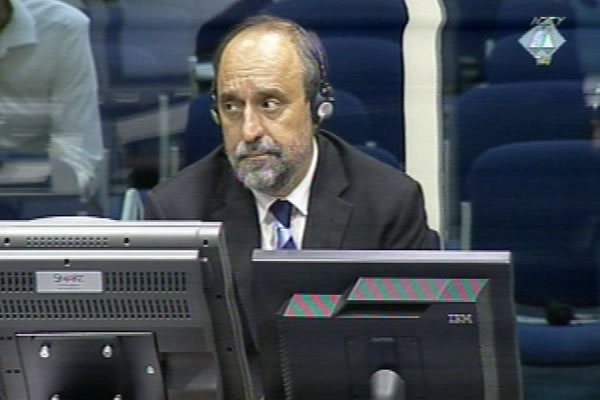Home
HADZIC: OVCARA WAS ‘A HUMANITARIAN, NOT MILITARY ISSUE’
Goran Hadzic claims that as the prime minister of the Serb Autonomous Region of Eastern Slavonia he had ‘no jurisdiction’ over the judiciary. During his tenure as the president of the Republic of Serbian Krajina, Hadzic advocated the exhumation of the mass grave in Ovcara. The Supreme Defense Council, under Hadzic’s chairmanship, didn’t discuss Ovcara because it was a ‘humanitarian, not military issue’
 Goran Hadzic testify in his own defence
Goran Hadzic testify in his own defence Goran Hadzic, former prime minister of the SAO Eastern Slavonia, who later became the president of the Republic of Serbian Krajina, is on trial for his failure to investigate the crimes committed by his subordinates and to punish the perpetrators. In his evidence in his own defense Hadzic said that the allegations were ‘not true’. He was prepared to ‘prove it mathematically’, Hadzic added.
In 1991, there was the military administration, there were military security organs, the military prosecutor and military courts: all of them were in charge of prosecuting perpetrators of crimes. In late 1991.Hadzic’s government ‘tried to establish courts’; by early 1992, they became operational. The courts operated ‘to the best of their ability’. However, Hadzic noted that as the prime minister he didn’t have any jurisdiction over the judges and the prosecutors. ‘We learn in high school about the division of powers: the legislature, the judiciary and the executive’, said Hadzic. He was part of the executive branch and he ‘didn’t interfere’ with the judiciary.
Cases against known and unknown perpetrators of the crimes against the Croats were brought before the courts, Hadzic explained. Direct attacks on Croats, robberies and murders were a ‘thorn in the side of the policy I supported’, Hadzic said. Such acts undermined his ‘ability to take political action’ and were ‘against the interests’ of the Republic of the Serbian Krajina.
As Hadzic said, as soon as he received the request for the exhumation of the remains of the Ovcara victims, he approved it. The international commission first sent the request to the RSK government, which held the view that the exhumations should be done ‘reciprocally’; this attitude slowed down the process. Moreover, Colonel Milan Milanovic, who later became an assistant defense minister in the RSK, was opposed to the exhumations. According to Hadzic, Milanovic had close ties with Radovan Stojicic Badza from the Serbian MUP.
Hadzic denied that the RSK Supreme Defense Council, which was chaired by him, had been opposed to the exhumation at Ovcara. The issue wasn’t discussed because in Hadzic’s view Ovcara was ‘a humanitarian and criminal’ issue, not a ‘military issue’. Three years passed from Hadzic’s approval in November 1993 to the actual start of the exhumation. Hadzic was ousted from power soon after his conversation with William Fenrick from the Expert Commission which investigated the violations of international humanitarian law in the former Yugoslavia. Hadzic’s position got ‘untenable’, and the police ‘started harassing’ him.
In the examination-in-chief, defense counsel Zivanovic noted that Hadzic couldn’t control the paramilitary and volunteer units, such as Arkan’s Tigers and Seselj’s Chetniks, in Eastern Slavonia. The defense quoted from an interview with Zivota Panic, who said that he ‘put all those units under [his] command’ and that they ‘carried out the tasks assigned to the [JNA] unit they belonged to’. Panic, former commander of the JNA 1st Military District, added that Arkan came to the area before the JNA and that he ‘probably had some private arrangements’ with the local leaders.
Hadzic denied that he had anything to do with Arkan’s men, White Eagles or Seselj’s Chetniks. ‘They were not under my control’, Hadzic concluded. Tomorrow, Hadzic will be questioned by the prosecution.
